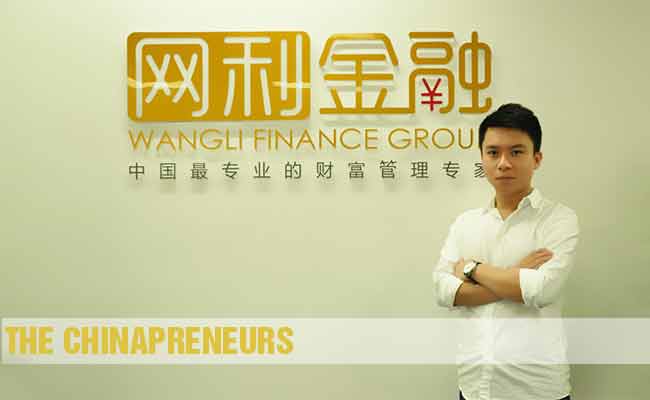In this series on The Chinapreneurs, we look at entrepreneurs’ experiences in starting a business in China. In the first one, Kevin Zhao, CEO of Wangli Bank, elaborates on starting up in China’s fast-changing internet finance sector.
The mobile internet boom has created numerous opportunities for entrepreneurs around the world, and it’s easier than ever today to build a billion dollar business, whether it is a social network, an instant messaging app, a cab-hailing tool, or in some cases in China, a bank.
How do you start an online bank from scratch? And how is it different from traditional banks? We posed these questions to Kevin Zhao, founder and CEO of Wangli Bank, a one-year-old start-up that just raised $40 million in a Series B funding round.
Wangli’s main business is actually a peer-to-peer (P2P) lending platform but its activities make it more like a bank —so while it can’t accept deposits, it disburses business loans (its only activity) by matching them with individual lenders, who earn ultra-high interest rates between 9% and 16%.
A 30-year-old former investment banker at Merrill Lynch, Zhao started Wangli Bank in early 2014 and persuaded a number of senior investment banking executives to join the company, including the former China Chairman of Merrill Lynch Liu Erfei. The company secured $10 million in its Series A funding round from IDG Ventures and has over $320 million in transactions so far. In March 2015, Zhao made the list of 30 Under 30, a list of “young disruptors, innovators and entrepreneurs” brought out by Forbes China.
We recently sat down with Zhao to talk about his personal experience as an entrepreneur in China’s crowded internet finance space and his observations of the industry. Through Zhao’s experience, we hope that you may gain a better understanding of the new $130-billion (and still growing) P2P industry in China.
Edited interview excerpts:
Q. Why did you leave investment banking to start a business in internet finance?
A. Firstly because I’m a very entrepreneurial person and I don’t feel like following the conventional career path. For example when I was in college [in the US], I co-founded a social networking site for overseas Chinese students called YouLin. It was bought by another start-up backed by Sequoia in 2007.
Secondly, I think there are big opportunities in this sector. Compared with the West, China’s banking system is not as developed, and a large number of small and medium-sized enterprises (SMEs) are underserved. There is huge demand for financing among those SMEs and the internet can help match those needs with individual lenders, while the existing system has no incentives to serve them.
Q. Where do you think your entrepreneurial spirit comes from?
A. My father was an entrepreneur back in the 1980s, so I may have inherited some qualities from him. And the other reason is that I started living independently since I was 12, as I moved from Shenzhen to Shanghai to attend junior high school. And then I left for the US before finishing high school.
For me, being independent is not only about taking care of myself; it also means that I have to constantly make my own decisions. Many people are afraid of making big decisions on their own and they always need to consult with others. The problem with that is that when you care too much about what other people think, you lose a part of yourself; and so you won’t be able to follow your heart and do what you truly wanted.
Q. You have some very senior investment banking executives on your management team, how did you convince them to join you?
A. It is difficult. But I think one key is that this industry itself is very attractive, and helping SMEs with their financing is a great cause, because they are vital to the success of the entire economy. If most SMEs are financially strangled, the economy is not far from collapsing.
The other key is that we have a promising business model, which is different from most other players in the field. We focus on serving businesses in selective industries (jewelry, redwood, used cars, etc), and by “plowing” deeply in those industries, we can gain unique competitive advantages.
And lastly I think my personal history as an entrepreneur is also helpful. They know that I’ve done this before and I’m familiar with the internet industry.
Q. Can you explain more about your business model? How is it different?
A. Firstly, unlike many P2P platforms, we made a clear choice not to include individual loans in our portfolio—we only focus on SMEs.
Secondly, we selected a number of industries that we believe are big in size, have great growth potential and contain a lot of SMEs with financing needs. So after we make our preliminary selection, we’ll conduct thorough research on those industries and develop close partnerships with the industry leaders, which is the expertise of us, investment bankers. And then we design financial products and risk control systems that suit this specific industry. And through the risk control systems, we are able to collect the data of companies and the industries they are in, which allows us to improve our products and risk management systems in the future.
So at the current stage, we care more about being the best service provider and data collector in specific industries than having higher transaction volumes across the board.
Q. Is it hard to earn the trust of those SMEs? The demand for services is obviously there. And what about the lenders? How careful are they?
A. Even though the demand is huge, it’s still a challenge to win over clients because this [internet finance] is a relatively new model. You have to convince them that you are effective and efficient, and more importantly, that you are not a fraud. Nonetheless, we are moving quite fast. We have set up 19 branches in different cities in one year.
And the trust issue between platforms and lenders is industry-wide, because there were so many fraudulent or amateur companies. That’s why we focus on three things [to gain trust]: firstly, we have built a professional team and raised money from well-known venture capital firm IDG; secondly, we make sure that every loan is transparent—investors know where and how their money is used, [the purpose of the loan and what industry it is used in]; thirdly, we emphasize on risk control before, not after, the loan. Traditional lending companies can only operate locally because they control risks afterwards—they have to know where to find the borrowers after they received the money.
Q. How do you control risks? Can you elaborate?
A. I mentioned data. We work with industry leaders to collect data of the industry and individual companies, so we are able to analyze and price risks for each project. This task is very time-consuming in the beginning. But I think as we grow and include more companies to connect with our IT system, the process will become more automated.
And another key strategy in risk control is that we try to form a “closed loop” within industries. I’ll give you one example: in the redwood business, the collateral of the loans is oftentimes the logs. So when a company pledged $1 million worth of logs at a discount, say, as $600,000 collateral, we make sure that our partners in the industry can take over the logs if a default happens. So in that case, the collateral becomes an attractive asset for our partner company, which therefore increases the efficiency of the clearing process because outsiders probably don’t know what to do with the logs. In other words, the potential problems of the loan are at the same time benefits for our partners in the industry.
Q. There are a lot of discussions on the upcoming government regulations on the P2P lending sector. What are your expectations?
A. I think there definitely will be regulations. But it’s going to be a difficult process because if the law is too tight, it could create another heavily regulated sector like the traditional banking sector; if the law is too loose, it may give fraudulent companies loopholes to survive [in]. In general, I think the regulators are happy to see those legitimate businesses in this industry, what they don’t want are the “bad apples” that cause a lot of risks to the system.
Honestly I don’t think any outsiders know when regulation details will be released. But we are well prepared, which means that we have built our system in accordance with the highest industry standards.
Q. You donated RMB 3 million to your high school in Shenzhen to set up a scholarship. Isn’t it a bit early for you to do philanthropy? Your company is still a start-up.
A. I think entrepreneurs should give back to society whenever they can. I’m very thankful to my high school, which had a great influence on me [and helped me] become more ambitious and brave. So I hope my experience will help inspire students who are interested in leadership and after-class activities.
And another thing is that I choose to donate money to a Chinese school, unlike some entrepreneurs who pick universities overseas that they even never went to. I think helping Chinese schools should have the priority over helping foreign schools, and I hope my actions will be a calling for more philanthropy inside China.
Q. What’s your biggest learning so far as a start-up entrepreneur?
A. You need to think and act outside of the box, and you need to constantly explore unknown areas. But doing that means that you have to deal with unexpected challenges and problems all the time. So I think compared with IQ (intelligence quotient) and EQ (emotion quotient), AQ (adversity quotient) is even more important. It represents your ability to solve problems and overcome difficulties. Taking (Alibaba founder) Jack Ma as an example—I think he has reached such a high level today because he has handled countless problems on a daily basis throughout his career. The sheer amount of problems he came across made him more experienced than most others today.
So I think problem solving is probably the most important quality for an entrepreneur. You may have to alter your strategies, or you may have to lose your team members—but what’s key is that you need to know how to face these issues and find solutions, which sometimes are not necessarily the best ones.




















